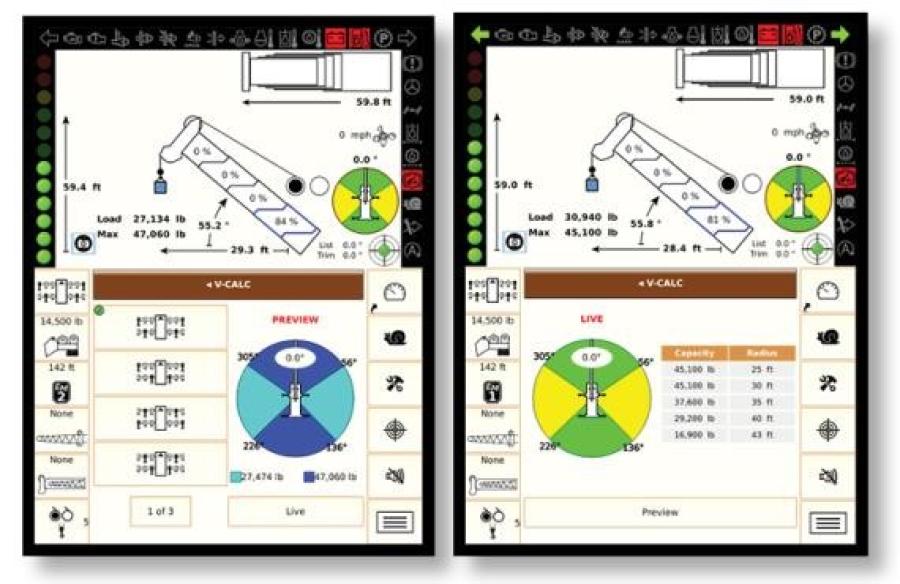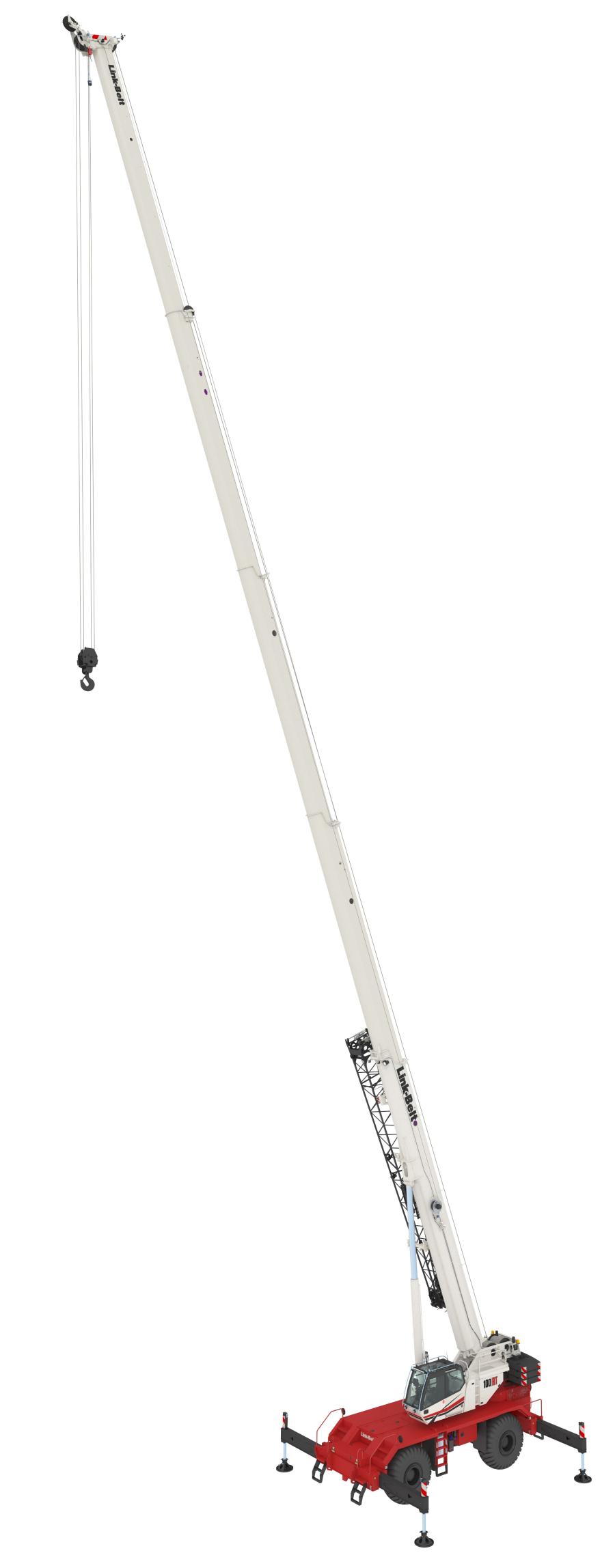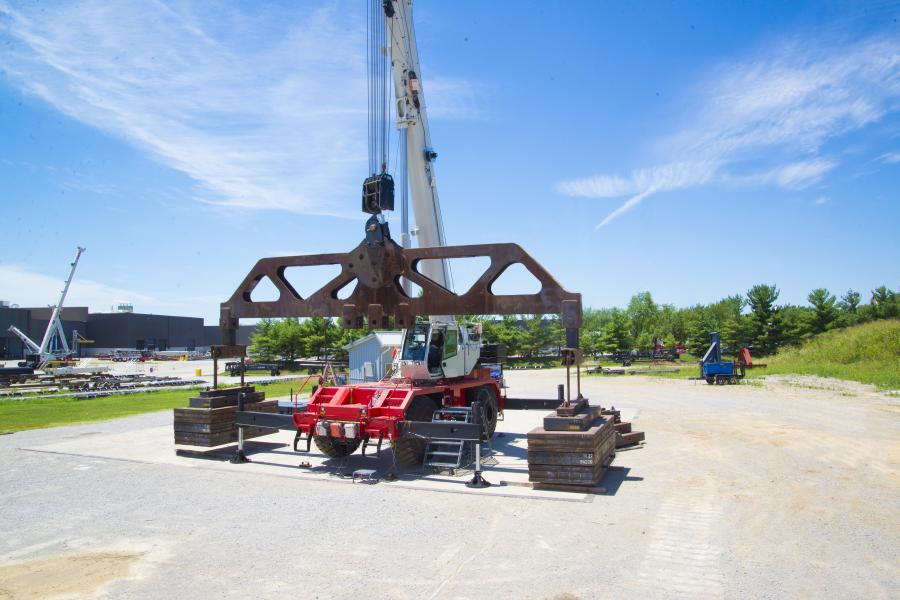“There’s not a full power boom out there that carries this capacity chart at radius,” said Brian Smoot, product manager telescopic rough terrain cranes.
Link-Belt is bringing a new 100RT rough terrain crane to the market with the longest full-power boom available.
"There's not a full power boom out there that carries this capacity chart at radius," said Brian Smoot, product manager telescopic rough terrain cranes. "This will be a dominant player for rental fleets, refineries, and plant work in general, handling longer radius with ease."
Other notable features for the 100RT include Link-Belt's latest operator cab design, Pulse 2.0 operating system with remote software updates via Wi-Fi, V-Calc asymmetrical outrigger options, a new simple-to-assemble fly, latest Cummins technology with a Stage V engine, and Link-Belt's Vision package.
Following rigorous on-site and field testing, shipments of the new 100-ton (90-t) 100RT rough terrain crane are scheduled to begin first quarter 2019.
Boom and Attachment
The 100RT delivers outstanding reach with a five-section 40.6 to 155 ft. (12.3 to 47.2 m) full-power formed boom, built to Link-Belt's specific boom profile and tolerances at its Lexington, Ky., campus. An available two-piece (35 to 58 ft. [10.7 to 17.7 m]) on-board offsettable fly provides greater flexibility and range, and manually offsets at 2, 15, 30 and 45 degrees. A 16 ft. (4.9 m) lattice insert extension provides a maximum tip height of 237 ft. (72.2 m).
The 100RT will be the first Link-Belt rough terrain crane to utilize the new fly erection technology from Link-Belt's latest telescopic truck and telescopic crawler cranes. A fly assist cylinder makes erecting and stowing the fly a one-person operation and minimizes work at height. Boom head speed screws and numbered spring loaded latches provide intuitive assembly. Given the natural elevation of a rough terrain crane boom, Link-Belt has simplified fly assembly with new ground level carrier controls. One control raises and lowers boom angle from 0 to -3 degrees, and another control is used for the fly assist cylinder.
Carrier
The 100RT's six-speed transmission is powered by a Cummins Stage V QSB 6.7L 232 hp (173 kW) diesel engine which is dual compliant for both Tier IV and Stage V standards. Four 29.5x25 tires mounted on axles affixed to the carrier via greaseless 4-link suspension, eliminating 10 previous grease points. Centralized electrical locations, remote mounted filters and easy-access fluid checks make routine service a breeze.
A 24-volt electrical system makes running diagnostics quicker and easier. The wiring is a Controller Area Network (CAN bus) system. The 24-volt system yields the ability to multiplex with modules placed near dedicated functions like outrigger beams and winches. In total, there are five modules located throughout the machine that allow crane functions to continue working in instances where other modules are being diagnosed or serviced.
Six points of access to the carrier deck are maintained with new ergonomic ladders, and regardless of slew angle, the operator has easy egress to the flat deck from the cab. The 100RT exterior features all new durable "tough skin" paint, along with a new slip-resistant paint on the carrier deck to provide better footing for access and egress.
V-CALC – RT Simple

Link-Belt's V-CALC (Variable Confined Area Lifting Capacities) system features 12 different outrigger configurations with real time 360-degree charts. V-CALC has proven itself in general construction and infrastructure applications on the 75RT. Outrigger beams (either fully retracted, intermediate or fully extended) are setup in pairs from side-to-side or front-to-rear. Once outriggers are set, the user-friendly Pulse 2.0 system indicates the crane's available capacity. The system then previews the operator's real time capacities given the crane's current configuration at the next five radiuses for a set boom angle.
Upon selection, Link-Belt Pulse 2.0 provides a live view of the working area with color-coded quadrants. If the chart exceeds capacity at a given slew angle, swing arrest will initiate five degrees prior — allowing the crane to come to a smooth stop.
Upper
High strength steel used in the upper frame accommodates a new winch design with ultra-wide drums for increased line pull at higher working layers. Maximum winch line pull of 23,632 lbs. (105.1 kN) provides a wider range of applications and contractor needs. Hydraulic outboard routings and wiring harness improvements offer form-fitted design, providing greater serviceability over the life of the crane. Three slabs of removable upper counterweight totaling 28,800 lbs. (13,063 kg) is standard equipment.
Cab
Introduced on the 75RT in 2017, Link-Belt's new cab design for its rough terrain cranes has been well received in the field, both in terms of visibility, operator comfort and intuitive design. All electrical components coming into the cab are bulk headed for "plug and play" assembly. Specific cab specifications include the following:

- 20 degree tilt
- Ergonomic seat with electronic joystick/single axis controllers
- Automotive-type, high capacity HVAC system
- Increased storage and interior lighting
- Time delayed wipers
- USB and 12-volt power supply connections
- Van-style pop out door
Based on ongoing operator and customer feedback, Link-Belt Pulse 2.0 provides a simple interface for crane operators with a larger touchscreen display, along with customizable programmable features. Link-Belt Pulse 2.0 can be updated and serviced remotely. Wi-Fi enabled, the system uses the serial number of the unit to determine if any updates are available, and download/installs to the appropriate controls.
Continuing a Focus on Work Conditions, Day or Night
Link-Belt carefully considers the location of swing out engine access doors and centralized electrical locations — keeping them accessible from the ground or near a grab handle or ladder. Transmission oil, engine oil, primary and secondary fuel filters, as well as the engine oil filter are mounted for easy reach.

The 100RT has been fitted with all the necessary tools to get the job done, any time of day:
- Dual amber strobe lights
- LED working lights
- Outrigger lights
- Work platforms on the upper with guardrails
- Operator programmable function kick outs
Link-Belt's camera vision package on the 100RT enhances on-board site monitoring and includes a back-up camera, as well as cameras for viewing winches and the right side of the upper.
Transport at Under 100,000 lbs
The 100RT will transport with base unit fully equipped minus modular counterweights at 92,859 lbs. (42,120.1 kg). With an overall height of 12 ft. 10 in. (3.91 m) this rough terrain can be driven right off a conventional lowboy trailer, assemble counterweight and be ready to go to work.
For more information, visit www.linkbelt.com.
This story also appears on Crane Equipment Guide.
Today's top stories


















